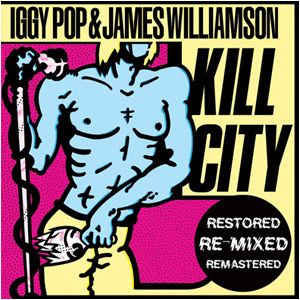
Kill City
Alive/Bomp!
With James Williamson having re-entered the Stooges fold earlier this year, it would seem a no-brainer to re-release Kill City, the album of demos the guitarist and Iggy Pop recorded in 1975 and Bomp! issued two years later. Though Pop and Williamson only worked on one more album together (1979’s New Values), there’s good reason for their collaborations being still highly regarded to this day.
For this edition of the album, Alive/Bomp! had the record remixed (with Williamson overseeing) and remastered to try to improve on the long lamented sub-par sound quality. While a little grit was never uncommon amongst the Stooges’ work, Kill City has long suffered from sounding second-rate. Here, though, the album has been reworked to sound nearly as good as anything else from the time. As such, the street-smart rockers the pair laid down with the help of saxophonist John Harden, drummer Brian Glascock and bassists Scott Thurston and Steve Trano finally gleam with the kind of savagery we always suspected they possessed.
Though Kill City can’t match the, well, raw power of Raw Power, it slinks with the same bloodthirsty demeanor. Harden’s sax squeals between Pop’s desperate vocals and Williamson’s mean riffs. It’s the sound of crossed wires, the bridge between the blues inflections of mid-70s Stones and the Bowery-style barbarism to come just a couple years later. There’s a groove to the album too, most recognizable on “Consolation Prizes,” with Pop belting out his vocals as much as he growls with clenched teeth.
While the title track is a spirited shakedown and “Sell Your Love” a fetching dark reverie, it is the punk boogie of “Beyond the Law” that first leaps out. Here, Pop howls against Harden’s squawk. “No Sense of Crime” shares a similar sensibility, but the dusty acoustic riffs are more backroads than urban. “Lucky Monkeys” starts within a similar motif, but Pop kicks his boots against the confines rather them kicks them off.
But “Johanna” is most likely the record’s penultimate cut. Pop yowls about the lover he doesn’t want, perhaps symptomatic of the hard times from which he just emerged. It is Kill City boiled down to its essentials: sax screeches, a big riff and a piano refrain. The song arches its back and never hides its teeth. If this was the direction Pop and Williamson would have gone (if only a label had been interested), then we missed out on something truly exceptional. As it is, though, with this version presenting the record as it should always have been heard, we at least are finally privy to this singular moment in all its glory.
Stephen Slaybaugh
PAST PERFECTS
INXS, Shabooh Shoobah
Fela Kuti, "Zombie" Batch, Part II
Royal Trux, Cats and Dogs
Fela Kuti, "Zombie" Batch, Part I
Arab Strap, The Week Never Starts Around Here and Philophobia
Superchunk, No Pocky for Kitty and On the Mouth
Queens of the Stone Age, Rated R
Billy Squier, Don't Say No
Department of Eagles, Archive 2003-2006
Spur, Of the Moments
Concrete Blonde, Bloodletting
The Undertones
Oasis, Time Flies 1994-2009
The Cure, Disintegration
